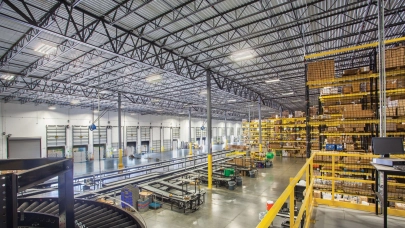
The number of state-owned companies relying on modern office space is on the rise, reveals Savills. The public sector and state-owned firms more than doubled their share in office take-up in Warsaw in Q1-Q3 2020 compared to last year. What’s more, Savills estimates that negotiations are pending for more than the amount of office space leased by this sector in the nine months to September 2020.
Q3 2020 was the first quarter on the Warsaw office market with clearly visible consequences of the economic downturn caused by the COVID-19 pandemic. Savills notes that the public sector and state-owned companies are beginning to play an increasingly important role on the office leasing market, a trend to look out for going forward.
“Offices of government bodies and state-owned companies have been associated so far mainly with older buildings. However, as the market continues to grow, the public sector is increasingly opting for relocation to modern office buildings. Paradoxically, it is frequently driven to do so by savings that modern offices can generate, among other things, thanks to lower service charges or an option to lease a smaller office but with a more efficient layout,” says Wioleta Wojtczak, Head of Research, Savills.
According to Savills, Warsaw’s office stock amounted to 5.82 million sqm at the end of September 2020 following the completion of 131,500 sqm in Q3 2020 across office projects that included The Warsaw HUB and Biura przy Warzelni of the Browary Warszawskie complex.
Meanwhile, office demand in Warsaw slumped to a ten-year low. Take-up climbed to just 113,200 sqm in July-September, with regearing accounting for nearly half of the total. The vacancy rate, therefore, began to edge up, as forecasted by Savills. It currently stands at 9.6% (exclusive of over 100,000 sqm of office space available for subletting).
In addition to the strong downturn in the leasing market, take-up structure also changed, with the public sector and state-owned companies accounting for a growing proportion of leasing activity. Warsaw, like most capitals of the world, is home to state institutions. However, of around 400 state-owned companies, only one in five is headquartered in Warsaw.
The share of the public sector and state-owned companies in Warsaw’s gross take-up was relatively stable in the previous two years, standing at 8.5% in 2018 and 10.6% in 2019, says Savills. In January-September 2020, such entities accounted for nearly a quarter of the total office transaction volume.
According to Savills experts, the approximately 105,000 sqm transacted by such tenants in the first three quarters of 2020 is only slightly up on the 93,000 sqm achieved by this sector in the whole 2019, but due to the recent decline in total leasing activity, this represents more than a twofold increase in the sector’s share of gross take-up.
The largest transaction completed by the public sector and state-owned companies in the year-to-date was the lease for 47,000 sqm in the Generation Park office tower near Daszyńskiego Roundabout announced by PZU in late June 2020. It was also the largest lease in the history of the Polish office market. Next in line was Poczta Polska, which extended its lease for 19,800 sqm in the Domaniewska Office Hub in Służewiec.
Savills estimates that negotiations are currently pending at various stages for approximately 125,000 sqm of in modern office buildings across Warsaw which are likely to be occupied by the public sector and state-owned companies.
“The office market is currently experiencing a temporary pause due to the COVID-19 pandemic. Some tenants are trying to delay relocation decisions in order to assess their headcount levels and the scale of working from home more precisely. However, to some organisations, the remote work model is not the most optimal solution for security reasons, for instance. These include many state-owned companies that frequently also need to think about their office locations well in advance. The fact that such tenants are taking account of returning to the traditional office work environment in their long-term strategies may be interpreted as a positive sign for the entire office market,” concludes Wioleta Wojtczak, Savills.



